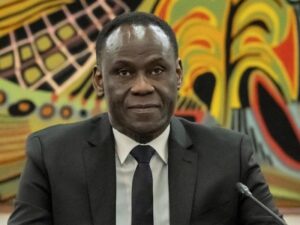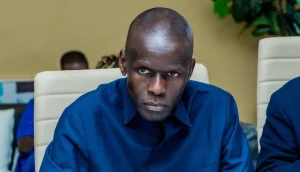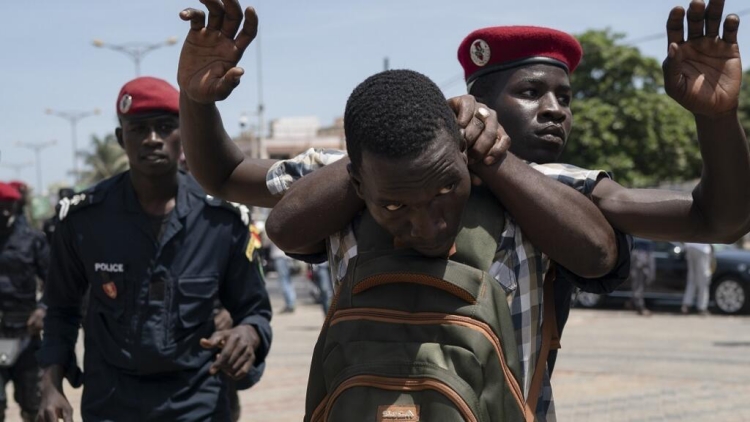Gambiaj.com – (Dakar, Senegal) – The Senegalese government has formally initiated a judicial investigation into the deadly political violence that rocked the country between 2021 and 2024, signaling a potential turning point in efforts to hold those responsible to account. The move comes amid mounting pressure on President Bassirou Diomaye Faye’s administration from within his own political camp, particularly the influential Pastef party.
Justice Minister Ousmane Diagne has officially referred the matter to the country’s Prosecutor General in a letter channeled through the appropriate hierarchy to Ibrahima Ndoye, the public prosecutor at the Dakar High Court.
According to Senegalese media reports, the investigation is expected to focus on four major infractions, including crimes against humanity, and could reach senior state officials who held power at the time.

The violence in question spanned several high-stakes political moments, most notably the protests surrounding the legal battles and arrests of then-opposition leader Ousmane Sonko.
Human rights organizations and civil society groups have long criticized the government’s handling of the unrest, which left over 80 people dead, according to estimates by activists and media reports.
Thousands were also arrested, including minors and journalists, during widespread crackdowns on dissent.
While the opening of a formal inquiry may appear to be a step toward justice, many within the ruling coalition—particularly from Pastef, the party founded by Sonko—have expressed deep frustration over what they describe as the slow pace of accountability.
Critics have begun to direct their dissatisfaction not only at the remnants of the previous regime but also at President Faye himself.
In recent weeks, high-profile figures, including Sonko’s lawyers, Me Ciré Clédor Ly and French attorney Juan Branco, have subtly but unmistakably criticized the president, suggesting that he has not done enough to deliver justice for the victims of the repression.
One of the most vocal critics has been Waly Diouf Bodian, a key figure in Pastef and current Director General of the Port of Dakar. On Sunday, Bodian posted on social media: “More than 80 Senegalese killed, billions embezzled… APR has no place left on the political scene.”
The APR (Alliance for the Republic), the party of former President Macky Sall, is seen by Pastef members as bearing responsibility for the alleged abuses.
The tension has extended to the judiciary, particularly the Constitutional Council, which some in Pastef accuse of bias against Ousmane Sonko.
The Council recently struck down proposed amendments to the internal rules of the National Assembly that would have allowed lawmakers to summon judges for hearings, even forcibly if necessary—a move interpreted as part of Pastef’s push to assert legislative oversight over the judiciary.

This second legal setback in Parliament has only deepened suspicion toward the Council within the ruling party. Now, discussions about its dissolution have reportedly intensified, with Bodian warning, “If we do not dissolve the Constitutional Council, we are heading toward surprises. I’ve said it, and I repeat: none of the current members were chosen by President Bassirou Diomaye Faye or Ousmane Sonko. So do you really think these people—handpicked by Macky Sall—will play their role properly? Believe me, the moment they get the chance, they’ll create problems for us. So why take that risk? Let’s establish a Constitutional Court with magistrates appointed by the President of the Republic,” Bodian said.
Analysts warn that calls for dissolving the Constitutional Council, while politically resonant among Pastef’s base, carry constitutional and institutional risks.
Senegal’s judiciary, particularly its highest courts, plays a critical role in maintaining democratic order and electoral legitimacy. Undermining them without a clear, legal transition path could provoke a constitutional crisis.
The standoff however reflects a deeper struggle within Senegal’s evolving democratic landscape: how to reconcile the demands for accountability and justice with the need to preserve judicial independence and constitutional order.
President Faye, who campaigned on a platform of “rupture and reform,” now faces a delicate balancing act. He must maintain the support of his political base, which expects swift and radical change, while ensuring the stability of state institutions and avoiding accusations of political interference in the judiciary.
As investigations proceed, all eyes will be on how the justice system handles this test of credibility—and whether the Faye administration can manage the growing impatience within its own ranks.










